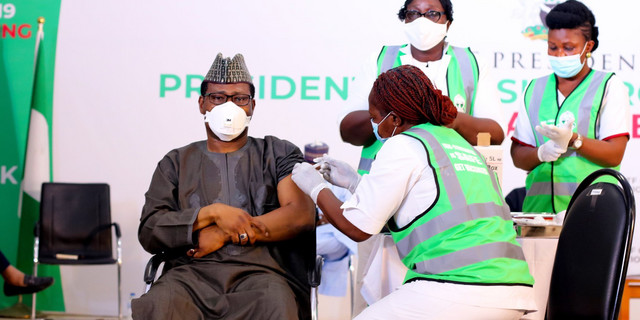By Asmau Ahmad
More than two million Nigerians have received the first dose of the Oxford/AstraZeneca COVID-19 vaccine, the National Primary Healthcare Development Agency (NPHCDA) said.
The Executive Director, Dr Faisal Shuaib, told newsmen that 2,099,568 people have been vaccinated with their first doses, while 1,005,234 have received their second doses of the vaccine as at Thursday.
He said the agency had extended the timeline for the administration of second doses of the vaccine from June 25 to July 5.
He explained that the decision to extend the timeline resulted from noticeable constraints of various economic and social engagements of recipients.
Dr Shuaib advised those who received the first dose not later than May 13 to visit the nearest vaccination site to receive the second dose as soon as possible for full protection.
He added that the administration of first doses is still on-going and urged Nigerians to avail themselves of the opportunity.
He admonished that even after receiving the second dose recipients should continue to observe the COVID-19 safety protocols as full vaccination does not provide for exemption.
“It is very important for everyone, including those who have received their second doses to continue to wear face masks and observe other non-pharmaceutical measures to prevent the spread of the virus,” he stressed.
Shuaib noted that after more than three million vaccinations, only 13,267 people experienced mild to moderate side effects, while 4,708 experienced moderate to severe side effects.
“The cases of mild, moderate and severe reactions that have been recorded are expected from normal vaccination and people who experienced any of these have since recovered and are doing well.
“Therefore, we should not allow the fear of side effects to discourage us from taking the vaccine, as the long term benefits of getting vaccinated far outweighs the risk of brief side effects.
“It is important to repeat that Nigeria has not recorded any case of death directly linked to COVID-19 vaccination,” Shuaib said.
WHO representative in Nigeria, Dr Walter Kazadi, said the threat of a third wave of COVID-19 was real and was on the increase in some African countries.
“It’s actually more dangerous than ever not because of people that are unvaccinated, but because of people not observing the safety protocols.
“It’s because people are not protecting themselves. People are not avoiding crowded places. People are not engaging in protective measures via social distancing and not wearing face masks when they need to,” he said.
Kadazi advised Nigerians to take the preventive measures seriously to complement vaccination adding that inequitable access to vaccines had become a catalyst for the virus to mutate, while undermining little gains made in some quarters.
He noted that rapid scale-up of vaccines production and improvement in supply mechanisms was crucial as 77 percent of all the vaccines administered globally since February was done in seven countries.
In his message at the briefing, UNICEF’s representative in Nigeria, Dr Peter Hawkins, in a message delivered by UNICEF official, Dr Gupta Gagan, noted that some countries had started the COVID-19 vaccination for children.




